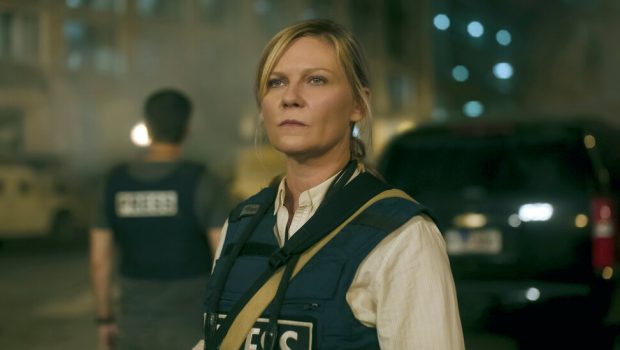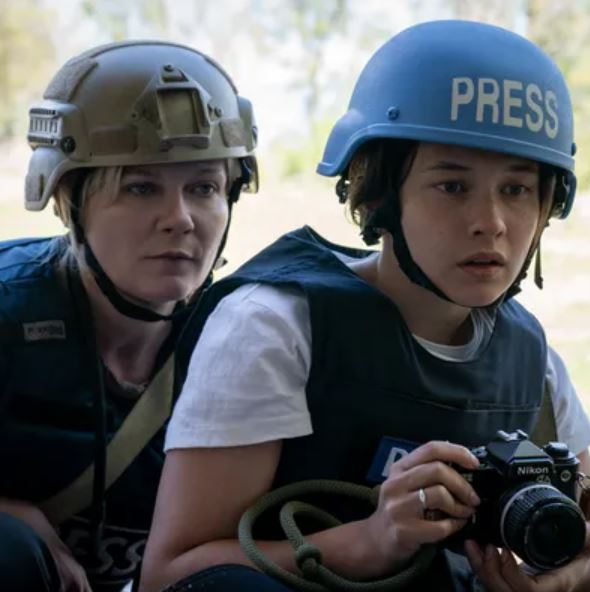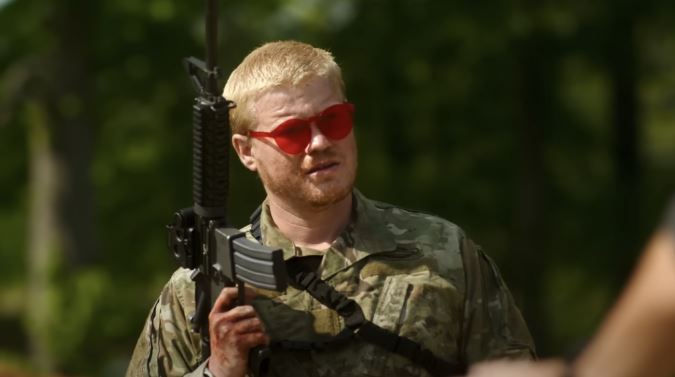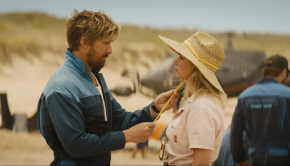Civil War – Film Review
Reviewed by Damien Straker on 25th of April 2024
Roadshow presents a film by Alex Garland
Written by Alex Garland
Produced by Andrew Macdonald, Allon Reich, and Gregory Goodman
Starring Kirsten Dunst, Wagner Moura, Cailee Spaeny, Stephen McKinley Henderson, Sonoya Mizuno, and Nick Offerman
Cinematography Rob Hardy
Edited by Jake Roberts
Music by Ben Salisbury and Geoff Barrow
Rating: MA15+
Running Time: 110 minutes
Release Date: the 11th of April 2024
Alex Garland’s anti-war feature Civil War concludes by trading thematic depth for action and suspense. Until then, the writer-director’s fourth film does not lack ideas or nerve. The film is an allegory for the steep political divisions in America sown by the toxicity of Donald Trump’s presidency and the MAGA movement. That portion of the story is clear. What transcends predictable flag-waving or jingoism is how Civil War preferences a psychologically challenging perspective of warfare. If only Garland resolved the film with the same thought-provoking intensity. The task is not beyond him. His previous films posed difficult questions and made women pivotal to the story. For example, his directorial debut, Ex Machina (2014), was one of the best sci-fi films of the last decade. While Civil War does not match that same level, the cast is impressive, and the action set pieces are deliberately unsettling.
The story’s premise is enticing and controversial. The action is set in modern-day America where a rogue President (Nick Offerman) is now serving out his third term. As a result, the country is at war with itself. Texas and California have somehow forged an alliance against the President’s violent militia. A hardened photojournalist named Lee (Kirsten Dunst) hatches a plan with her colleagues, Joel (Wagner Moura) and Sammy (Dune’s Stephen McKinley Henderson), to undertake an interview with the dangerous President. However, Lee is unexpectedly accompanied by a young photographer, Jessie (Priscilla’s Cailee Spaeny). Lee first meets her after a bomb blast wipes out a large protest. Jessie later tells Lee how inspired she is by her work. Reluctantly, Lee allows the young woman to accompany them on their dangerous road trip towards Washington. The journey towards the President is loaded with strange and frequently deadly occurrences where the team does not always know who they can trust. A saving grace is how Lee grows increasingly protective of Jessie.
Watching the film on an IMAX screen is a devastating sensory experience. Civil War has some of the loudest sound effects since Saving Private Ryan (1998). It is not for show either because it enhances the film’s themes. Consider the opening scene with the protestors. We are placed alongside Lee as both political sides jostle violently in the streets. The voices of the groups deliberately overlap. The loud bomb blast then silences the action. Alex Garland is dramatising violence from an outsider’s perspective. Rather than understanding either side’s ideology, Lee only photographs the action. The incoherence of the dialogue reflects this neutrality. Lee’s proximity to the explosion is also critical to Civil War’s thematic goals. It underlines the danger in which journalists and photographers find themselves. How they remain neutral in an increasingly brutal conflict and resist emotional trauma is a pivotal dramatic question. In another scene, Jessie is horrified when she sees a man strung up after being tortured. Lee then asks the man’s captors if they can be photographed. The lack of intervention shows how Lee as a journalist is morally and politically removed from the violence. The enhanced sound and visuals continue to underline this unique, distanced perspective of warfare.
The film’s narrative is told through the episodic structure of a road movie. Within this framework, some scenes are a little clunky around the edges. However, the linearity builds a solid emotional pattern. For example, the way Civil War hard cuts between quiet moments and intense skirmishes is effective. One evening, Jessie is told to rest because she might not have time to sleep. The film then hard cuts to the middle of a deadly shootout. The journalists are perched on the shoulders of soldiers exchanging fire so they can quickly photograph key moments of battle. The gunfire is ear-splitting. The editing and soundscape show the stark emotional dislocation of warfare. The scene ends with a violent execution is filmed from a long angle shot. The camera angle shows how Lee is removed from the war’s moral questions as she photographs the soldiers from afar. Garland’s approach and Lee’s perspective are synonymous. He is disinterested in the war’s progression and broader politics. Instead, he is capturing both the downtime and the adrenaline of warfare. He does not shy from employing humour either. Some unexpected dark comedy occurs when the team hides from a sniper in a Christmas village. Once again, the episodic form shows the unpredictability of combat and how it forms an emotional detachment for the journalists as they try to remain neutral.
It is a pity the closing scenes in Washington dispense with Civil War’s otherwise bleak realism. As if to justify the film’s $50 million budget, Garland’s camera becomes preoccupied with showing endless military hardware. The sequence is then pulled in two directions. One is building character as Lee crumbles under pressure. The other is making the action resemble the video game series Call of Duty. Soldiers pour through rooms of the White House, searching for the President who is hiding inside. Michael Bay would be proud. Lee’s breakdown is then abruptly abandoned once she infiltrates the building. The sequence fails because of the inconsistent character behaviour. Meanwhile, the action lacks the intense realism of the earlier battles. Instead, the climax results in an obvious dramatic point about the risks journalists take for the perfect shot. It is consistent with the story’s through-line, but the execution is better suited to a conventional Hollywood blockbuster.
Fortunately, Kirsten Dunst carries the film with one of the best performances of her career. From the very beginning the weight of trauma in her eyes is visible. There is not a scene where we fail to believe this woman has seen terrible things and is reaching the end. The growth in her character also counters the nihilism. Numerous scenes shift her opinion of Jessie from total exclusion to becoming an increasingly protective parental figure. Both Dunst and Cailee Spaeny sell this gentle bond effectively before the movie grows loud and silly. Stephen McKinley Henderson as the oldest journalist on the team brings weight and empathy to Sammy, particularly as someone reluctant to place himself in danger. One of the film’s most dominant performances features in just one scene. Jesse Plemons (married to Dunst in real life) has a nerve-shredding cameo as a militia figure who interrogates the team with a machine gun while standing over a mass grave. The moment typifies how skilful Garland is at creating suspense on a small scale. It also underlines what an incredible character actor Plemons is as he memorably injects himself into pivotal cameos. Nick Offerman feels wasted since the President is only at the very beginning and end of the film. Largely though the main performances cannot be faulted and account for why we care about the characters.
There are many positives to draw from this topical and highly suspenseful film. Kirsten Dunst’s weary, battle-worn performance and her chemistry with Cailee Spaeny are a highlight. The unique way Garland frames these characters as journalists who must observe human atrocities from a distance only to be drawn deeper into the conflict on a personal level is very effective. If the film sustained its realism, it would have been more satisfying. Its flaws aside, Civil War has been a success at the US box office. The way it mirrors America’s fractured politics and tribalism is resonating with audiences from both sides of the political spectrum. Given the film’s power it is not hard to understand why. Its action sequences are thoughtful enough to ask an important, universal question about warfare: how long can you observe tyranny from afar before it personally affects you?
Summary: There are many positives to draw from Civil War, a topical and highly suspenseful film.












